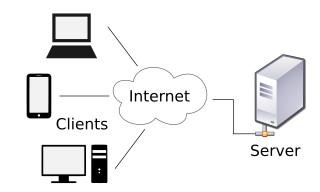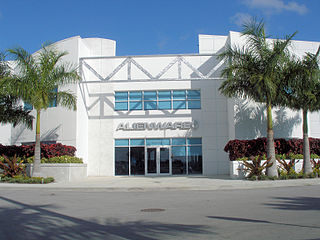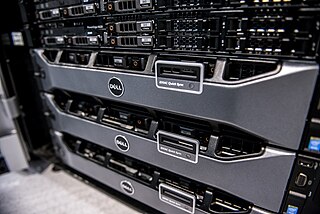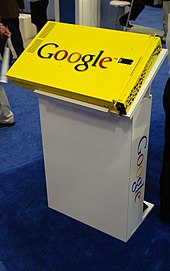
Silicon Graphics, Inc. was an American high-performance computing manufacturer, producing computer hardware and software. Founded in Mountain View, California in November 1981 by James Clark, its initial market was 3D graphics computer workstations, but its products, strategies and market positions developed significantly over time.

A server is a computer that provides information to other computers called "clients" on computer network. This architecture is called the client–server model. Servers can provide various functionalities, often called "services", such as sharing data or resources among multiple clients or performing computations for a client. A single server can serve multiple clients, and a single client can use multiple servers. A client process may run on the same device or may connect over a network to a server on a different device. Typical servers are database servers, file servers, mail servers, print servers, web servers, game servers, and application servers.

Data General Corporation was one of the first minicomputer firms of the late 1960s. Three of the four founders were former employees of Digital Equipment Corporation (DEC).
Quantum Corporation is a data storage, management, and protection company that provides technology to store, manage, archive, and protect video and unstructured data throughout the data life cycle. Their products are used by enterprises, media and entertainment companies, government agencies, big data companies, and life science organizations. Quantum is headquartered in San Jose, California and has offices around the world, supporting customers globally in addition to working with a network of distributors, VARs, DMRs, OEMs and other suppliers.

The SGI Tezro is a series of high-end computer workstations sold by SGI from 2003 until 2006. Using MIPS CPUs and running IRIX, it is the immediate successor to the SGI Octane line. The systems were produced in both rack-mount and tower versions, and the series was released in June 2003 with a list price of US$20,500. The Tezro was released alongside the SGI Onyx4 and rack-mountable Tezros share many components with it, including plastic skins. The rack-mounted Tezros are functionally very similar to an Infinite Performance-equipped SGI Onyx350. Tezro marked the return of the original cube logo to SGI machines.

Alienware Corporation is an American computer hardware subsidiary brand of Dell. Their product range is dedicated to gaming computers and accessories and can be identified by their alien-themed designs. Alienware was founded in 1996 by Nelson Gonzalez and Alex Aguila. The development of the company is also associated with Frank Azor (co-founder), Arthur Lewis, Joe Balerdi, and Michael S. Dell (CEO). The company's corporate headquarters is located in The Hammocks, Miami, Florida.

The Dell Digital Jukebox or just Dell DJ is a brand name for a series of digital audio players sold by the Dell corporation.
PowerLinux is the combination of a Linux-based operating system (OS) running on PowerPC- or Power ISA-based computers from IBM. It is often used in reference along with Linux on Power, and is also the name of several Linux-only IBM Power Systems.

Google data centers are the large data center facilities Google uses to provide their services, which combine large drives, computer nodes organized in aisles of racks, internal and external networking, environmental controls, and operations software.
The Dell Remote Access Controller (DRAC) is an out-of-band management platform on certain Dell servers. The platform may be provided on a separate expansion card, or integrated into the main board; when integrated, the platform is referred to as iDRAC.

The PowerEdge (PE) line is Dell's server computer product line. PowerEdge machines come configured as tower, rack-mounted, or blade servers. Dell uses a consistent chip-set across servers in the same generation regardless of packaging, allowing for a common set of drivers and system-images.
The current portfolio of PowerConnect switches are now being offered as part of the Dell Networking brand: information on this page is an overview of all current and past PowerConnect switches as per August 2013, but any updates on current portfolio will be detailed on the Dell Networking page.

Dell Vostro is a line of business-oriented laptop and desktop computers manufactured by Dell aimed at small to medium range businesses. From 2013–2015, the line was temporarily discontinued on some Dell websites but continued to be offered in other markets, such as Malaysia and India.
The Origin 3000 and the Onyx 3000 is a family of mid-range and high-end computers developed and manufactured by SGI. The Origin 3000 is a server, and the Onyx 3000 is a visualization system. Both systems were introduced in July 2000 to succeed the Origin 2000 and the Onyx2 respectively. These systems ran the IRIX 6.5 Advanced Server Environment operating system. Entry-level variants of these systems based on the same architecture but with a different hardware implementation are known as the Origin 300 and Onyx 300. The Origin 3000 was succeeded by the Altix 3000 in 2004 and the last model was discontinued on 29 December 2006, while the Onyx 3000 was succeeded by the Onyx4 and the Itanium-based Prism in 2004 and the last model was discontinued on 25 March 2005.
The Dell Inspiron Mini Series is a line of subnotebook/netbook computers designed by Dell. The series was introduced in September 2008 amidst the growing popularity of low-cost netbook computers introduced by competitors.
Exalogic is a computer appliance made by Oracle Corporation, commercially available since 2010. It is a cluster of x86-64-servers running Oracle Linux or Solaris preinstalled.

POWER8 is a family of superscalar multi-core microprocessors based on the Power ISA, announced in August 2013 at the Hot Chips conference. The designs are available for licensing under the OpenPOWER Foundation, which is the first time for such availability of IBM's highest-end processors.

Computers can be classified, or typed, in many ways. Some common classifications of computers are given below.
Dell EMC Unity is one of Dell EMC's mid-range storage array product lines. It was designed from the ground up as the next-generation midrange unified storage array after the EMC VNX and VNXe series, which evolved out of the EMC Clariion SAN disk array.
Inspur Server Series is a series of server computers introduced in 1993 by Inspur, an information technology company, and later expanded to the international markets. The servers were likely among the first originally manufactured by a Chinese company. It is currently developed by Inspur Information and its San Francisco-based subsidiary company - Inspur Systems, both Inspur's spinoff companies. The product line includes GPU Servers, Rack-mounted servers, Open Computing Servers and Multi-node Servers.











